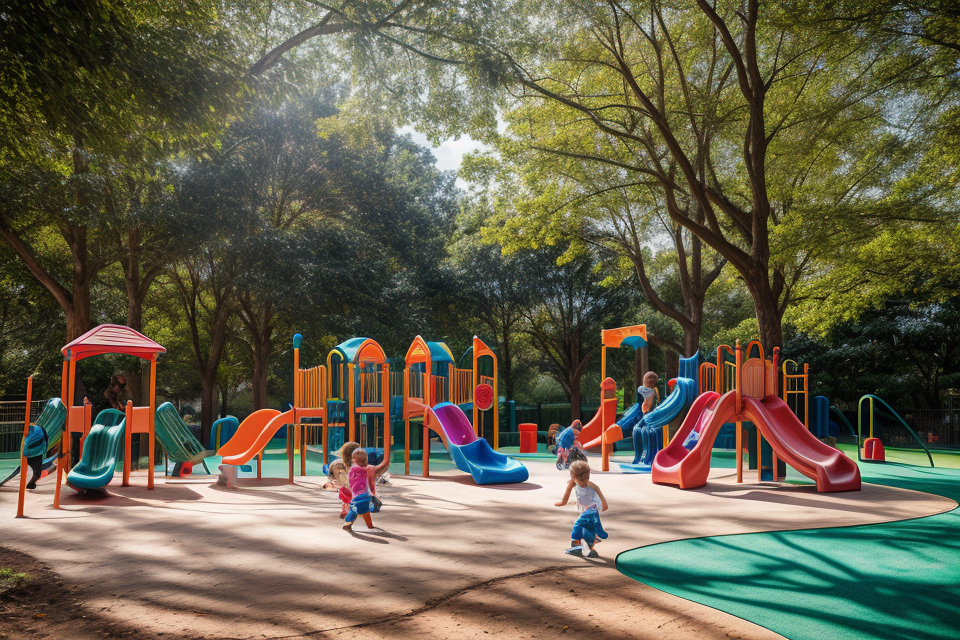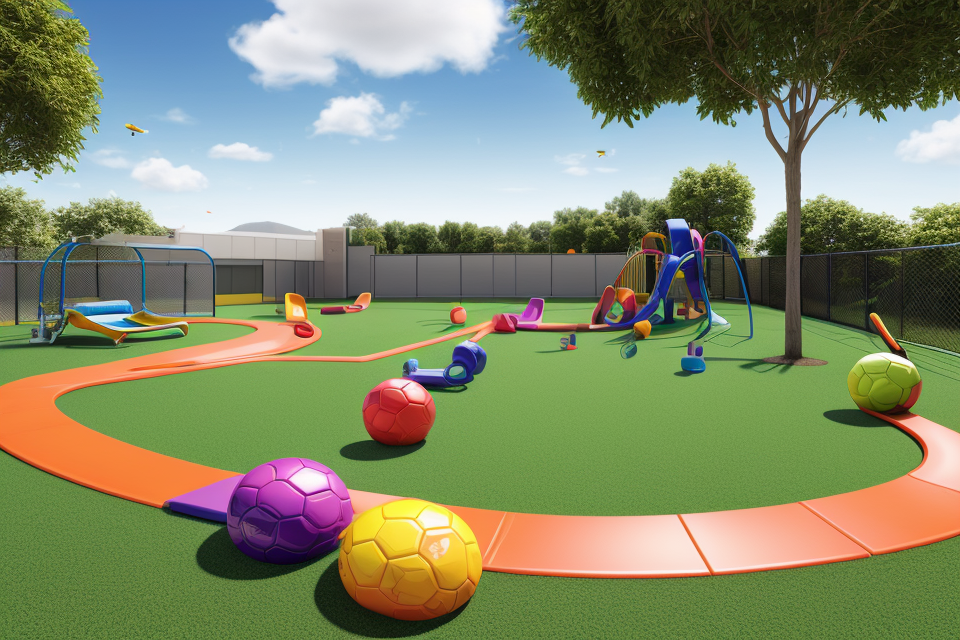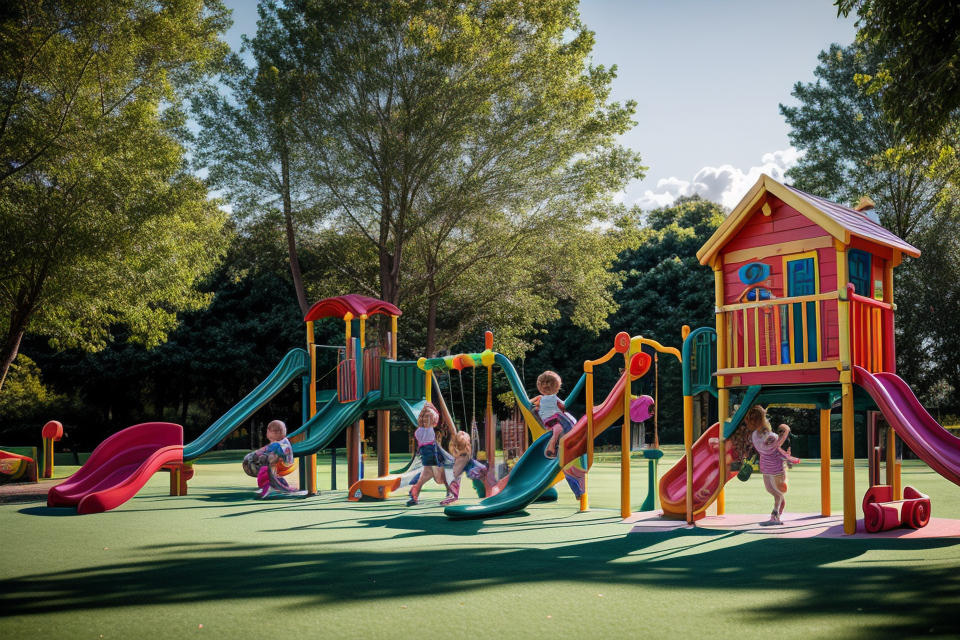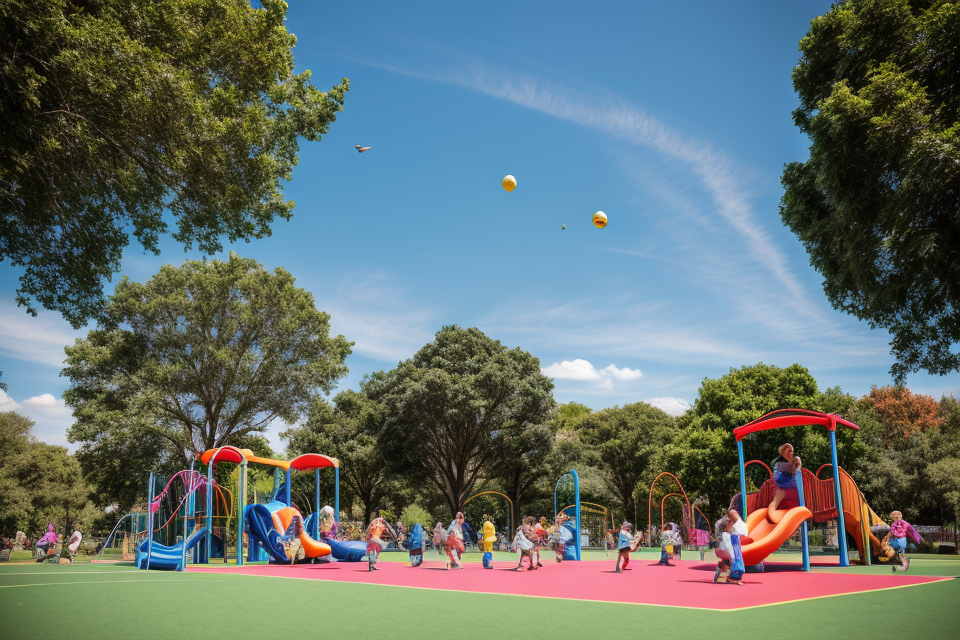As the sun rises and the birds start to sing, children eagerly wait to play outside with their outdoor toys. Little do they know that these toys are essential for their development. Outdoor toys provide children with endless opportunities to explore, create, and learn. They help develop physical abilities, social skills, creativity, and imagination. Playing with outdoor toys allows children to connect with nature, which is vital for their mental and emotional well-being. So, let’s dive into the world of outdoor toys and discover why they are so important for a child’s growth and development.
Importance of Outdoor Play
Benefits of Outdoor Play for Children
Outdoor play is a crucial aspect of a child’s development, offering numerous benefits that can positively impact their physical, emotional, and cognitive growth. Some of the most significant benefits of outdoor play for children include:
- Developing Physical Skills: Outdoor play allows children to engage in various physical activities, which helps them develop gross motor skills, balance, coordination, and endurance. Activities such as climbing, running, and jumping help children build strength, flexibility, and agility, while also improving their overall fitness levels.
- Enhancing Emotional Well-being: Spending time outdoors has been shown to reduce stress and anxiety levels in children, while also promoting emotional stability and resilience. Outdoor play provides children with opportunities to explore and express their emotions, build self-esteem, and develop empathy and social skills.
- Boosting Cognitive Development: Outdoor play provides children with a rich and diverse environment that encourages exploration, creativity, and imagination. This type of play helps children develop problem-solving skills, critical thinking, and cognitive flexibility, while also fostering a love for learning and a desire to discover new things.
- Fostering a Connection with Nature: Outdoor play provides children with a unique opportunity to connect with nature and the environment. By exploring the natural world, children develop an appreciation for the environment, a sense of stewardship, and a desire to protect and preserve the planet for future generations.
- Encouraging Social Interaction: Outdoor play provides children with opportunities to interact with other children, fostering social skills, cooperation, and teamwork. Playing outdoors allows children to develop friendships, learn how to share, and practice communication skills in a fun and relaxed setting.
Overall, outdoor play is essential for child development, offering a range of benefits that can help children grow and thrive in all aspects of their lives.
Types of Outdoor Toys
There are numerous types of outdoor toys that can promote child development in various ways. Here are some of the most common types of outdoor toys:
- Building Blocks: Building blocks are classic outdoor toys that promote creativity, problem-solving skills, and imagination. Children can use these blocks to build anything they can imagine, from castles to spaceships.
- Bicycles: Bicycles are great outdoor toys that promote physical activity, balance, and coordination. They also teach children about traffic safety and responsibility.
- Swings: Swings are fun outdoor toys that promote gross motor skills, balance, and coordination. They also provide a sense of excitement and freedom for children.
- Climbing Frames: Climbing frames are great outdoor toys that promote physical activity, coordination, and problem-solving skills. They also encourage children to explore their physical limits and challenge themselves.
- Sandbox: Sandboxes are excellent outdoor toys that promote creativity, imagination, and social interaction. Children can use sand to build castles, dig tunnels, and create all sorts of creative designs.
- Sports Equipment: Sports equipment such as soccer balls, basketballs, and baseballs are great outdoor toys that promote physical activity, teamwork, and social interaction. They also teach children about fair play, rules, and sportsmanship.
- Hiking Gear: Hiking gear such as backpacks, boots, and water bottles are great outdoor toys that promote adventure, exploration, and independence. They also teach children about the natural world, conservation, and environmental stewardship.
These are just a few examples of the many types of outdoor toys that can promote child development. The key is to provide children with a variety of toys that challenge them in different ways and encourage them to explore the world around them.
Choosing the Right Outdoor Toys
Factors to Consider When Selecting Outdoor Toys
When selecting outdoor toys for children, it is important to consider several factors to ensure that the toys are safe, age-appropriate, and stimulating. Here are some key factors to keep in mind:
- Safety: Safety should always be the top priority when choosing outdoor toys. Look for toys that are made from durable materials and have no sharp edges or small parts that can be easily removed. Toys with warning labels or choking hazards should be avoided.
- Age-appropriateness: Choose toys that are appropriate for your child’s age and developmental stage. Toys that are too advanced may be too challenging, while toys that are too simple may be boring for older children.
- Stimulation: Outdoor toys should be stimulating and encourage children to use their imagination and creativity. Look for toys that promote physical activity, problem-solving skills, and social interaction.
- Cost: Outdoor toys can range in price from very affordable to quite expensive. Set a budget and look for toys that offer the best value for your money.
- Environmental impact: Consider the environmental impact of the toys you choose. Look for toys made from sustainable materials or those that can be recycled or reused.
- Space requirements: Consider the space available for playing with the toys. If you have a small yard, for example, you may want to choose toys that can be easily stored or that require less space.
- Weather resistance: Some outdoor toys are designed to withstand different weather conditions, while others are not. Consider the climate in your area and choose toys that can withstand the elements.
By considering these factors, you can choose outdoor toys that are safe, age-appropriate, stimulating, and environmentally friendly, providing your child with hours of fun and learning opportunities in the great outdoors.
Age-Appropriate Outdoor Toys
When it comes to selecting outdoor toys for children, it is important to consider their age and developmental stage. The right outdoor toys can provide endless opportunities for play, exploration, and learning. Here are some tips for choosing age-appropriate outdoor toys:
- Toddlers (1-3 years old)
- Simple outdoor toys that encourage gross motor skills, such as push and pull toys, ride-on toys, and balls.
- Toys that promote imaginative play, such as dolls, action figures, and stuffed animals.
- Toys that develop fine motor skills, such as puzzles, building blocks, and play dough.
- Preschoolers (3-5 years old)
- Outdoor toys that encourage social play, such as playhouses, cars, and trucks.
- Toys that promote problem-solving skills, such as puzzles, building sets, and matching games.
- Toys that develop coordination and balance, such as ride-on toys, tricycles, and climbing structures.
- School-age children (6-12 years old)
- Outdoor toys that encourage physical activity, such as bicycles, skateboards, and sports equipment.
- Toys that promote creativity and imagination, such as arts and crafts supplies, costumes, and role-playing props.
- Toys that develop critical thinking skills, such as board games, building sets, and science kits.
By choosing age-appropriate outdoor toys, parents can ensure that their children are engaged in play that is appropriate for their developmental stage. This will help children develop important skills, such as gross and fine motor skills, social skills, problem-solving skills, and creativity. Additionally, outdoor play provides numerous benefits for children’s physical and mental health, including increased physical activity, reduced stress, and improved cognitive development.
Enhancing Cognitive Development with Outdoor Toys
Stimulating Creative Thinking
Outdoor toys play a vital role in stimulating creative thinking in children. By providing an environment that encourages exploration and imaginative play, outdoor toys can help children develop their problem-solving skills, increase their creativity, and enhance their cognitive abilities.
Some ways in which outdoor toys can stimulate creative thinking include:
- Providing an open-ended environment: Outdoor toys, such as building blocks, can provide children with an open-ended environment that allows them to create and explore without a set of specific rules or directions. This freedom to create and experiment can stimulate creative thinking and help children develop their own ideas and solutions.
- Encouraging imaginative play: Outdoor toys, such as dress-up clothes or pretend play items, can encourage children to use their imagination and engage in pretend play. This type of play can help children develop their creativity and storytelling abilities, as well as encourage them to think outside the box.
- Fostering social interaction: Outdoor toys, such as games or sports equipment, can foster social interaction and teamwork. Playing with others can help children develop their communication and collaboration skills, as well as encourage them to think creatively and work together to solve problems.
Overall, outdoor toys can provide children with a wealth of opportunities to stimulate their creative thinking and develop their cognitive abilities. By encouraging exploration, imagination, and social interaction, outdoor toys can help children build the skills they need to succeed in all areas of life.
Developing Problem-Solving Skills
Outdoor toys play a crucial role in enhancing cognitive development in children. One of the most significant benefits of outdoor toys is that they help children develop problem-solving skills. This is because outdoor toys often require children to think creatively and come up with innovative solutions to overcome challenges.
Here are some ways in which outdoor toys can help children develop problem-solving skills:
- Building structures: Children can use outdoor toys such as building blocks, Legos, and K’NEX to build structures. This process requires them to visualize the end product, identify the necessary materials, and solve any problems that arise during construction.
- Puzzles: Outdoor toys such as puzzles can help children develop problem-solving skills by requiring them to think logically and figure out how to put the pieces together.
- Sports: Playing sports such as soccer or basketball requires children to make quick decisions and problem-solve on the fly. For example, if a player is being guarded, they must figure out how to get past their defender and score a goal.
- Obstacle courses: Outdoor obstacle courses can challenge children to think creatively and come up with solutions to overcome obstacles. For example, they may need to figure out how to climb over a wall or balance on a beam.
Overall, outdoor toys provide children with a range of opportunities to develop problem-solving skills. By engaging in these activities, children can enhance their cognitive development and learn to think creatively and critically.
Promoting Physical Health and Fitness
Encouraging Physical Activity
Encouraging physical activity is crucial for a child’s development as it helps in the growth and strengthening of muscles, improvement of coordination and balance, and enhancement of cardiovascular health. Outdoor toys play a significant role in promoting physical activity in children, as they provide a variety of opportunities for kids to engage in active play.
One of the key benefits of outdoor toys is that they allow children to explore and interact with their environment in a hands-on manner. This type of active play helps to develop motor skills, coordination, and balance, as well as encourages children to be more physically active. Outdoor toys such as bicycles, scooters, and skateboards provide opportunities for children to engage in physical activity while having fun.
Another advantage of outdoor toys is that they promote social interaction and cooperation. Many outdoor toys, such as sports equipment and playground games, require multiple players to participate, which encourages children to work together and build teamwork skills. Additionally, outdoor toys provide children with the opportunity to engage in imaginative play, which helps to develop their creativity and problem-solving skills.
In conclusion, outdoor toys are essential for promoting physical activity in children. They provide a variety of opportunities for active play, which helps to develop motor skills, coordination, and balance. Outdoor toys also promote social interaction and cooperation, which helps children to build teamwork skills and develop their creativity and problem-solving abilities.
Developing Gross Motor Skills
Outdoor toys play a crucial role in promoting physical health and fitness in children. One of the primary benefits of outdoor play is the development of gross motor skills, which are essential for a child’s overall physical development.
Gross motor skills refer to the ability to control large muscle movements that are required for physical activities such as running, jumping, throwing, and catching. These skills are developed through repetitive movements and physical activity, and are essential for a child’s coordination, balance, and overall physical fitness.
Outdoor toys that encourage active play, such as tricycles, jump ropes, and sports equipment, provide children with opportunities to develop these skills. Playing with these toys requires children to use their muscles and joints in a variety of ways, improving their coordination and balance.
Additionally, outdoor activities such as hiking, biking, and climbing provide children with opportunities to engage in more challenging physical activities that further develop their gross motor skills. These activities also promote a sense of adventure and exploration, which can help children build confidence and resilience.
In conclusion, outdoor toys are essential for promoting physical health and fitness in children. They provide opportunities for children to develop gross motor skills, which are essential for their overall physical development. Through active play and challenging physical activities, children can improve their coordination, balance, and physical fitness, while also having fun and exploring the world around them.
Building Social and Emotional Skills
Encouraging Cooperative Play
Encouraging cooperative play is essential for a child’s social and emotional development. Through playing with others, children learn how to share, communicate, and collaborate, which are crucial skills for success in life. Outdoor toys provide children with the opportunity to engage in cooperative play in a natural environment.
Cooperative play allows children to learn how to work together towards a common goal. It teaches them how to listen to others, share ideas, and take turns. Playing with others also helps children develop empathy and understanding of different perspectives. They learn to see things from other people’s point of view and to appreciate the differences between them.
Moreover, outdoor toys that encourage cooperative play, such as building blocks, puzzles, and team sports, provide children with a sense of accomplishment and pride. They learn to work towards a common goal and celebrate their successes together. This fosters a sense of belonging and community, which is essential for emotional well-being.
Furthermore, cooperative play also helps children develop problem-solving skills. When playing with others, children are often faced with challenges that require creative thinking and critical analysis. They learn to think outside the box and to come up with innovative solutions to problems. This promotes cognitive development and enhances their ability to think logically and creatively.
In conclusion, encouraging cooperative play through outdoor toys is essential for a child’s social and emotional development. It helps children learn how to share, communicate, collaborate, and solve problems. By providing children with opportunities to engage in cooperative play, we can help them develop the skills they need to succeed in life and build strong, supportive relationships with others.
Fostering Emotional Intelligence
Outdoor toys play a crucial role in fostering emotional intelligence in children. Emotional intelligence refers to the ability to recognize, understand, and manage one’s own emotions, as well as the emotions of others. Here are some ways in which outdoor toys can help children develop emotional intelligence:
Developing Empathy
One of the most important aspects of emotional intelligence is empathy, which is the ability to understand and share the feelings of others. Outdoor toys that encourage imaginative play, such as pretend play or role-playing, can help children develop empathy by allowing them to practice understanding and sharing the feelings of others. For example, a child may pretend to be a doctor and take care of a stuffed animal, which helps them understand the feelings of someone who is sick or in pain.
Managing Emotions
Another important aspect of emotional intelligence is the ability to manage one’s own emotions. Outdoor toys that encourage physical activity, such as running, climbing, and balancing, can help children develop their ability to manage their emotions. For example, a child who is feeling frustrated or angry may use physical activity to release their emotions and feel better.
Building Self-Confidence
Outdoor toys can also help children build self-confidence, which is an important aspect of emotional intelligence. Children who feel confident in themselves are more likely to be able to express their emotions and manage difficult situations. Outdoor toys that provide opportunities for success, such as building structures with blocks or hitting a target with a toy, can help children build self-confidence and feel good about themselves.
Practicing Problem-Solving
Finally, outdoor toys can help children develop problem-solving skills, which are an important aspect of emotional intelligence. Children who are able to solve problems effectively are more likely to be able to manage their emotions and navigate difficult situations. Outdoor toys that require creative thinking and problem-solving, such as puzzles or building sets, can help children develop these skills and feel confident in their ability to solve problems.
Overall, outdoor toys can play an important role in fostering emotional intelligence in children. By providing opportunities for imaginative play, physical activity, self-confidence building, and problem-solving, outdoor toys can help children develop the skills they need to manage their emotions and navigate the world around them.
Encouraging Parents to Provide Outdoor Toys for Their Children
As parents, it is our responsibility to provide our children with the best possible opportunities for growth and development. One of the most effective ways to do this is by encouraging them to play with outdoor toys. Outdoor play has been shown to have numerous benefits for children’s social and emotional development, including the development of important skills such as cooperation, communication, and empathy.
Here are some ways in which parents can encourage their children to play with outdoor toys:
- Lead by example: Children learn by observing their parents and caregivers, so it’s important to show them the value of outdoor play by participating in it yourself. Take your child on a nature walk, build a fort together, or simply spend time playing catch in the park.
- Provide a variety of outdoor toys: There are countless outdoor toys available, from sports equipment to building blocks to gardening tools. Encourage your child to explore different types of outdoor toys and find the ones that they enjoy the most.
- Create a safe and accessible outdoor space: Children need a safe and accessible outdoor space to play in. Make sure that your child’s outdoor area is free of hazards and has appropriate equipment for their age and abilities. Consider adding features such as a sandbox, climbing structure, or swing set.
- Encourage unstructured play: While organized sports and activities are important for children’s development, unstructured play is equally important. Encourage your child to explore their creativity and imagination through free play, whether it’s building a fort in the backyard or simply running around in the park.
By encouraging our children to play with outdoor toys, we can help them develop the social and emotional skills they need to thrive in life. So get outside, enjoy the fresh air, and let your child’s imagination run wild!
FAQs
1. Why are outdoor toys important for children?
Outdoor toys are important for children because they provide an opportunity for them to engage in physical activity and explore the natural world. Playing with outdoor toys can help children develop their gross motor skills, hand-eye coordination, and balance, which are important for their overall physical development. In addition, outdoor play can also promote social interaction, creativity, and imagination, which are essential for cognitive and emotional development.
2. What are some examples of outdoor toys?
There are many types of outdoor toys that can encourage children to play and explore the outdoors. Some examples include swings, slides, climbing frames, trampolines, bicycles, scooters, and sandboxes. Outdoor toys can also include sports equipment such as balls, bats, and Frisbees, as well as nature-inspired toys such as binoculars, bug catchers, and birdhouses.
3. How can outdoor toys benefit a child’s cognitive development?
Outdoor toys can benefit a child’s cognitive development by promoting creativity, imagination, and problem-solving skills. For example, building a fort with sticks and branches requires children to use their imagination and creativity, while also problem-solving to figure out how to balance the sticks and keep the fort stable. Outdoor play can also help children develop an appreciation for the natural world, which can lead to a greater understanding and appreciation of science and the environment.
4. Are outdoor toys safe for children?
When choosing outdoor toys for children, it is important to consider safety factors such as age-appropriate play equipment and materials, securely anchored outdoor structures, and appropriate supervision. Parents should also check for any recalls or safety concerns related to specific toys and brands. In addition, outdoor toys should be made from durable materials that can withstand weather conditions and regular use.
5. How can parents encourage their children to play with outdoor toys?
Parents can encourage their children to play with outdoor toys by setting aside dedicated time for outdoor play, creating a safe and accessible outdoor play area, and modeling outdoor play behavior themselves. Parents can also get involved in outdoor play with their children, participating in games and activities, and encouraging imaginative and creative play. Finally, parents can provide a variety of outdoor toys that appeal to their child’s interests and abilities, and offer positive reinforcement and encouragement for outdoor play.



